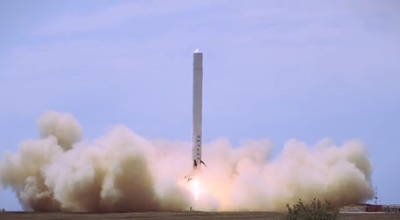How a few technical failures can spell success for SpaceXby R.D. Boozer
|
| “The tests are going beautifully, which fundamentally means we're not pushing the envelope hard enough. We should have some failures… We need to push harder.” |
By now, everyone has heard about the destructive termination of a test flight of the prototype Falcon 9R-Dev vehicle that occurred at SpaceX’s experimental flight area near McGregor, Texas on August 22. Some in the news media often appear not to know the difference between a demonstration flight and an experimental test. This rocket was not supposed to be a flight demonstration of mature technologies, but instead an experimental test of a booster equipped with three engines. Indeed, the “Dev” designation in the vehicle’s name stands for “developmental.” SpaceX is not the only company backed by a billionaire that uses this incremental test philosophy of reusable launch vehicle development: Jeff Bezos’s more secretive Blue Origin company is attacking reusable spaceflight in a similar way, and has also suffered setbacks in flight experiments.
Before ever beginning these powered takeoff and landing experiments at McGregor, SpaceX CEO Elon Musk commented, “I do think there probably will be some craters along the way; we’ll be very lucky if there are no craters. Vertical landing is an extremely important breakthrough – extreme, rapid reusability.” SpaceX president Gwynne Shotwell remarked a year ago, “The tests are going beautifully, which fundamentally means we're not pushing the envelope hard enough. We should have some failures… We need to push harder.” Judging from the result of this last test, they are now indeed pushing the envelope harder.
Other than Bezos, the major domestic and international competitors of SpaceX apparently believe that all they have to do is economize enough to meet SpaceX’s current lower launch prices to continue to thrive in the commercial satellite launch market. However, that mindset is based on a naïve assumption that SpaceX will not be able to lower their prices even further via reusability. It is that mindset that could lead to the ultimate doom of the long established orbital launch vehicle companies as viable businesses.
SpaceX and Blue Origin aim not just to be competitive, but instead to completely disrupt the entire space launch industry with radically lower launch costs. To do this, they are willing to risk a fraction of their budgets on cutting-edge Research and Development and apply that money to develop launch vehicle and spacecraft reusability technologies. Yes, they stand a chance of losing the money they put into such efforts, but the potential future reward is huge by orders of magnitude (see “Rocket reusability: a driver of economic growth”, The Space Review, March 10, 2014). A few failures of experimental vehicles along the way should thus not be a surprise.
